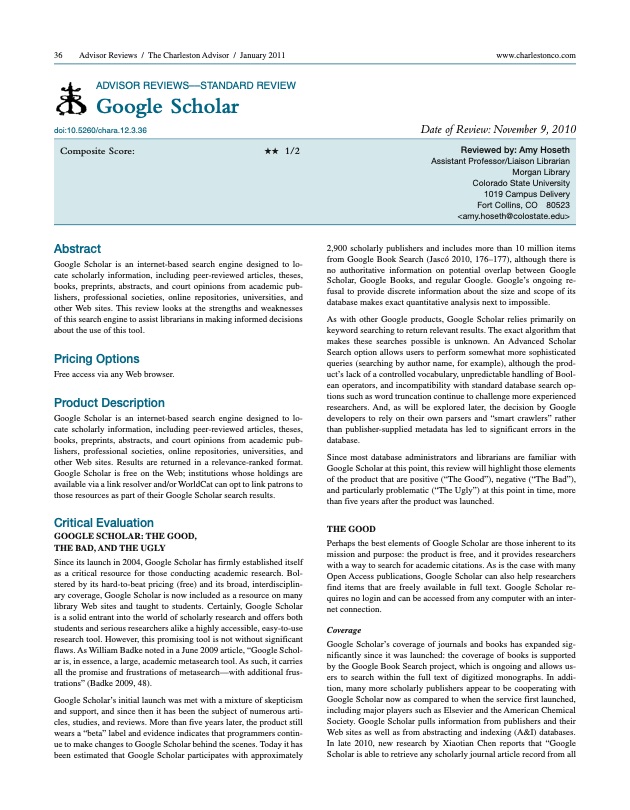abstract
Google Scholar is an internet-based search engine designed to lo- cate scholarly information, including peer-reviewed articles, theses, books, preprints, abstracts, and court opinions from academic pub- lishers, professional societies, online repositories, universities, and other Web sites. This review looks at the strengths and weaknesses of this search engine to assist librarians in making informed decisions about the use of this tool.
pricing options
Free access via any Web browser.
product description
Google Scholar is an internet-based search engine designed to lo- cate scholarly information, including peer-reviewed articles, theses, books, preprints, abstracts, and court opinions from academic pub- lishers, professional societies, online repositories, universities, and other Web sites. Results are returned in a relevance-ranked format. Google Scholar is free on the Web; institutions whose holdings are available via a link resolver and/or WorldCat can opt to link patrons to those resources as part of their Google Scholar search results.
critical evaluation
GOOGlE SCHOlAR: THE GOOD, THE BAD, AND THE UGly
Since its launch in 2004, Google Scholar has firmly established itself as a critical resource for those conducting academic research. Bol- stered by its hard-to-beat pricing (free) and its broad, interdisciplin- ary coverage, Google Scholar is now included as a resource on many library Web sites and taught to students. Certainly, Google Scholar is a solid entrant into the world of scholarly research and offers both students and serious researchers alike a highly accessible, easy-to-use research tool. However, this promising tool is not without significant flaws. As William Badke noted in a June 2009 article, “Google Schol- ar is, in essence, a large, academic metasearch tool. As such, it carries all the promise and frustrations of metasearch––with additional frus- trations” (Badke 2009, 48).
Google Scholar’s initial launch was met with a mixture of skepticism and support, and since then it has been the subject of numerous arti- cles, studies, and reviews. More than five years later, the product still wears a “beta” label and evidence indicates that programmers contin- ue to make changes to Google Scholar behind the scenes. Today it has been estimated that Google Scholar participates with approximately
2,900 scholarly publishers and includes more than 10 million items from Google Book Search (Jascó 2010, 176–177), although there is no authoritative information on potential overlap between Google Scholar, Google Books, and regular Google. Google’s ongoing re- fusal to provide discrete information about the size and scope of its database makes exact quantitative analysis next to impossible.
As with other Google products, Google Scholar relies primarily on keyword searching to return relevant results. The exact algorithm that makes these searches possible is unknown. An Advanced Scholar Search option allows users to perform somewhat more sophisticated queries (searching by author name, for example), although the prod- uct’s lack of a controlled vocabulary, unpredictable handling of Bool- ean operators, and incompatibility with standard database search op- tions such as word truncation continue to challenge more experienced researchers. And, as will be explored later, the decision by Google developers to rely on their own parsers and “smart crawlers” rather than publisher-supplied metadata has led to significant errors in the database.
Since most database administrators and librarians are familiar with Google Scholar at this point, this review will highlight those elements of the product that are positive (“The Good”), negative (“The Bad”), and particularly problematic (“The Ugly”) at this point in time, more than five years after the product was launched.
THE GOOD
Perhaps the best elements of Google Scholar are those inherent to its mission and purpose: the product is free, and it provides researchers with a way to search for academic citations. As is the case with many Open Access publications, Google Scholar can also help researchers find items that are freely available in full text. Google Scholar re- quires no login and can be accessed from any computer with an inter- net connection.
Coverage
Google Scholar’s coverage of journals and books has expanded sig- nificantly since it was launched: the coverage of books is supported by the Google Book Search project, which is ongoing and allows us- ers to search within the full text of digitized monographs. In addi- tion, many more scholarly publishers appear to be cooperating with Google Scholar now as compared to when the service first launched, including major players such as Elsevier and the American Chemical Society. Google Scholar pulls information from publishers and their Web sites as well as from abstracting and indexing (A&I) databases. In late 2010, new research by Xiaotian Chen reports that “Google Scholar is able to retrieve any scholarly journal article record from all
PDF Image | Google Scholar

PDF Search Title:
Google Scholar
Original File Name Searched:
Google_Scholar.pdf
DIY PDF Search: Google It | Yahoo | Bing
Cruise Ship Reviews | Luxury Resort | Jet | Yacht | and Travel Tech More Info
Cruising Review Topics and Articles More Info
Software based on Filemaker for the travel industry More Info
The Burgenstock Resort: Reviews on CruisingReview website... More Info
Resort Reviews: World Class resorts... More Info
The Riffelalp Resort: Reviews on CruisingReview website... More Info

